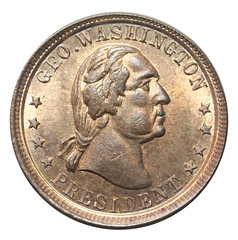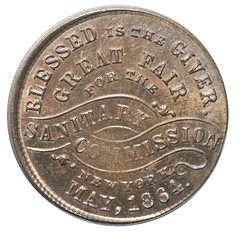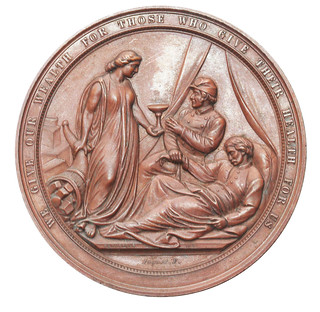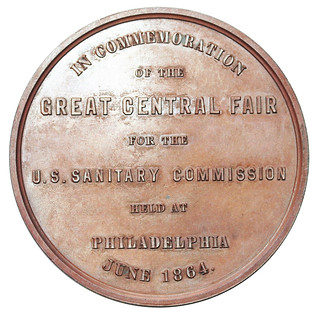
PREV ARTICLE
NEXT ARTICLE
FULL ISSUE
PREV FULL ISSUE
CIVIL WAR ERA SANITARY FAIR NUMISMATICAAn article by Dave Schenkman in the Spring 2020 Civil War Token Journal from the Civil War Token Journal Society discusses the numismatica of Civil War Sanitary Fairs. With permission, here's an excerpt. Thanks to Jennifer Meers and CTWS President Susan Trask for providing the images and text. -Editor NUMISMATICA OF THE CIVIL WAR ERA SANITARY FAIRS AND RELATED ORGANIZATIONS
 
New York Civil War token During the Crimean War of 1853-1856, the British Secretary of War authorized Florence Nightingale (who later established the world’s first secular nursing school and is considered the creator of modern nursing), to visit the battlefield to care for injured troops. What she and the nearly 40 nurses that went with her discovered was an appalling situation, with by far the majority of deaths coming from diseases rather than battle wounds. The British eventually sent a sanitary commission to help improve conditions at the camps. The idea for a United States Sanitary Commission came from the British organization. According to Kantor, author of a book that is primarily concerned with the numerous stamps and covers emanating from the various fairs during the Civil War era, two Union soldiers were perishing from diseases for every one dying from combat. The United States Sanitary Commission was officially established on June 18, 1861, by federal legislation, and branch associations rapidly sprang up in numerous other cities. The Commission was a private relief organization, its purpose being to improve living conditions for military personnel. They established about 30 rest homes for injured and traveling soldiers, staffed hospitals and hospital ships, and many other related projects. During the war they distributed more than $15 million to military camps, hospitals, prisons, etc. More than 15,000 women volunteered their services to work at hospitals and aid centers during the Civil War. They also raised money by collecting donations, making uniforms, comforting the sick and dying, and were instrumental in organizing the sanitary fairs. Famous women, including novelist Louisa May Alcott and author Katherine Prescott Wormeley, lent their services to the effort.  
Philadelphia Sanitary Commission medal Money to aid wounded and disabled soldiers was raised in many ways, some of them quite unconventional. In 1864 an Austin, Nevada general store owner by the name of Reuel Colt Gridley made a wager on the outcome of the local mayoral election with a friend, wherein the loser had to walk through town accompanied by the local band, carrying a 50 pound bag of flour. Gridley won the bet; after it was “paid” it was suggested that he auction off the bag, with the proceeds going to the Sanitary Fund. The high bidder donated it back to be re-auctioned, and each high bidder thereafter did the same, until more than $8,000 was raised. For more information on the Civil War Token Journal Society, see:
Wayne Homren, Editor The Numismatic Bibliomania Society is a non-profit organization promoting numismatic literature. See our web site at coinbooks.org. To submit items for publication in The E-Sylum, write to the Editor at this address: whomren@gmail.com To subscribe go to: https://my.binhost.com/lists/listinfo/esylum All Rights Reserved. NBS Home Page Contact the NBS webmaster 
|